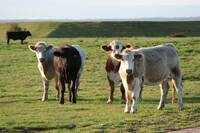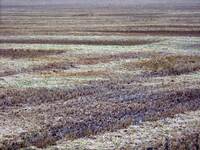- England
- Scotland
- France
- Holland
- Germany
- Italy
- Spain
- Portugal
- USA
- China
- Japan
- India
- Iran
- Advice
- Gardens
- England
- Scotland
- France
- Holland
- Germany
- Italy
- Spain
- Portugal
- USA
- China
- Japan
- India
- Iran
- Advice
- Garden Tours
Book: Landscape Planning and Environmental Impact Design: from EIA to EID
Chapter: Chapter 7 Agriculture, farming and countryside policy
Aghast at the absurdities of agricultural policy, I did not include a chapter on the landscape of agriculture in the first edition of this book. Since then (1986) the situation in Europe has worsened, through the introduction of 'set-aside' policies. But there is more debate about reform and I have sought to apply the principles outlined in Part 1 of this book to the question of landscape planning in rural areas [Fig 7.1]. It may help to think of the task as country planning, rather than agricultural planning. Let us begin with the absurdities. After the peace of 1815, British agriculture was protected only for 30 years, until 1846, by the corn laws. Fifty years after the peace of 1945, European agriculture continues to be heavily subsidised by town dwellers. This has mostly led to disbenefits for non-farmers, such as industrialised food and a loss of wildlife habitats. Europe's Common Agricultural Policy became famous for its butter mountains, grain storage silos, wine lakes, BSE and meat stores. After 1992, the storage problem was reduced by equally expensive supply controls. They drive land prices up and food quality down. In less-intensively farmed areas, like Britain's uplands, subsidies are available either for planting trees on land where they would grow naturally, or for keeping sheep which prevent natural regeneration. In the lowlands, subsidies are offered either for intensive farming, which destroys wildlife, or for making nature reserves, which promote wildlife. Towns have more bird species than agricultural land. The set-aside policy, which pays farmers for doing nothing, gives most cash to the great landowners, possibly because they have the most experience of leisure pursuits. Set-aside payments encourage rich farmers to sack poor farmworkers. There would be more sense in subsidising bureaucrats to write ponderous memos to coalminers instructing them to excavate coal, stack it in neat piles and wait 6 weeks before putting it back. Unwanted milk used to be poured into coalmines, where it polluted water supplies. Under Europe's Common Agricultural Policy, it is given to underdeveloped countries in order to enrich the governing elite, bankrupt local farmers and increase susceptibility to coronary heart disease. The Policy is as stupid as it is wicked. In the USA there are similar absurdities: Conventional agriculture in the United States includes capital-intensive monocultures; continuous cropping; a substantial reliance on manufactured inputs such as fertilizer, pesticides, and machinery; as well as an extensive dependence on credit and government subsidies... In addition, soils have become compacted and lost fertility; ground-water has been depleted and polluted with pesticides and fertilizers; wildlife habitats have been lost or damaged due to chemical runoff; and forests, range, and wetlands have been converted to croplands. (Neher 1992). In the 1960s, it was suggested that British farmers could be subsidised, in part, to maintain the countryside in good condition for the public. This would have included the care of farm walls, hedgerows and ancient grasslands [Fig 7.2]. Their reaction was haughty: 'We are farmers - not park-keepers'. In the 1990s many farmers were begging to be employed as park-keepers, though not in so many words. Here is a typical comment, from the BBC farming programme on 12.12.95, about farming on Britain's sheep-grazed uplands. 'Without farming in the hills we are not going to have the landscape which the public wants. The public must be willing to invest to keep this type of landscape'. 'The hills' is a romantic name for Britain's great tracts of barren over-grazed peaty moorland with signs reading 'Trespassers will be prosecuted and dogs shot'. It is odd that the speaker should have used the word 'invest' to justify public expenditure on environmental degradation. It means 'clothe' in the College of Heralds, 'lay siege to' on the field of battle, and 'employ money for profit' on Wall Street. In connection with upland farming, the quoted speaker was evidently using 'invest' to mean 'pour money down drains'. He was asking for 'investment' in a type of landscape few want. Public expenditure should be on public goods. Ecological, scenic, and recreational assessments and plans are requisite.


